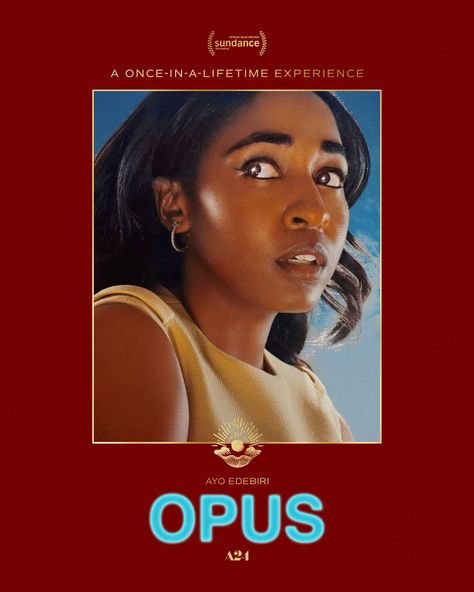'Opus': Promising Start, Predictable Finish
By Natalie McCarty
Image Courtesy of A24
Mark Anthony Green’s Opus is, at first glance, a sleek psychological thriller with that signature A24 gloss. Chilly, alluring, and vaguely European even though it’s not, underneath the aesthetic polish, Opus feels both tremendously structured yet a little hollow. Unfortunately, this is the kind of film that seduces you in the first act, only to leave you checking your watch halfway through. Still, I left the theater thinking about it, which probably means it’s doing something right.
The premise is familiar, almost comfortably so: Ariel Ecton (Ayo Edebiri), a sharp but slightly green music journalist, receives a golden ticket invite to the secluded estate of Alfred Moretti (John Malkovich), a pop legend who dropped off the grid decades ago. Moretti’s reputation has swirled into something cultish over the years.. He’s gathered a select group of journalists and influencers under the pretense of a creative retreat, but we know better. The air is too still, the house too perfect, and Moretti too smooth for this to be anything but a trap.
And it is, but perhaps not in the way you think. The first act is hypnotic, a slow, velvety slide into discomfort. Green knows how to build unease with the lingering camera shots, perfectly symmetrical framing, and characters speaking just a half-second too slowly. Ariel quickly realizes that Moretti’s ‘retreat’ is more like a social experiment (again, very Midsommar, very Blink Twice), and the guests part of an orchestrated performance that only Moretti understands. The tension builds deliciously until it doesn’t, because then comes the second act.
It’s not that the second act is bad; it’s just... predictable. The film settles into a familiar rhythm: paranoia, betrayal, exposure, collapse. The guests unravel, secrets are revealed, Moretti’s god complex swells to operatic proportions. You know how this goes because you’ve seen it a million times before where the cold, calculating genius unraveling as his creation spirals out of his control (Ex Machina sends its regards). There’s a sense that Green is trying to say something profound about fame, creation, and media consumption, but the message feels half-formed, like it got lost somewhere in the edit.
Image Courtesy of A24
However, even when the story falters, Ayo Edebiri keeps you anchored. She’s magnetic here–funny, vulnerable, sharp. Ariel could’ve easily been a cipher, but Edebiri gives her layers. Playing Ariel as both the outsider and the insider, hyper-aware of the industry games while still wanting to win them, was a genius move. There’s a scene where Moretti asks Ariel if she’s ever created anything of real value, and the way Edebiri’s face flickers between amusement and devastation in that moment is just so Edebiri. She makes the film feel human even when the script veers toward the mechanical.
Image Courtesy of A24
And John Malkovich slides into the role of Alfred Moretti like he was born for it. Moretti is a figure of contradictions: charming and predatory, self-aware and utterly deluded. Malkovich delivers every line with that quiet menace he’s perfected over the years. It’s not a particularly surprising performance, but it’s so satisfying to watch him work that you don’t mind. There’s a scene toward the end where Moretti addresses the guests like a cult leader delivering his final sermon, and it’s the closest the film comes to transcendence. Malkovich leans into the theatricality of it, knowing exactly how much to give without tipping into camp.
What’s fascinating, and frustrating, about Opus is that it’s almost too self-aware. The title itself signals that Green knows he’s making a film about creation, about legacy, about the price of artistic ambition. Moretti’s compound feels like a metaphor for the creative process. It’s isolated, it’s demanding, and it’s dangerous. And yet, the film never quite sticks the landing. It’s too manicured. Midsommar worked because Ari Aster let it spiral into chaos. Blink Twice had that biting satire, the glint of humor beneath the horror. Opus feels like it wants to do both but can’t quite commit.
Image Courtesy of A24
Still, I have a feeling this will find an audience as the (pun intended) cult classic potential is strong. The rest of the ensemble was definitely strong, just not terribly well-written. The visuals alone with Moretti’s glass-and-stone estate, the crisp monochrome wardrobes, the unnervingly symmetrical dining table shots, will keep the film bro crowd fed for awhile. And Edebiri and Malkovich’s performances will give it staying power, even if the narrative itself doesn’t quite hold up.
Ultimately, Opus feels like a work in progress, which is fitting, considering the title. It’s flawed but fascinating, polished but unfinished. And maybe that’s the point. Creation is messy. Obsession is dangerous. Legacy is a double-edged sword. Green may not have delivered his magnum opus, but he’s certainly composed something worth talking about.
Final Rating - ★★★




